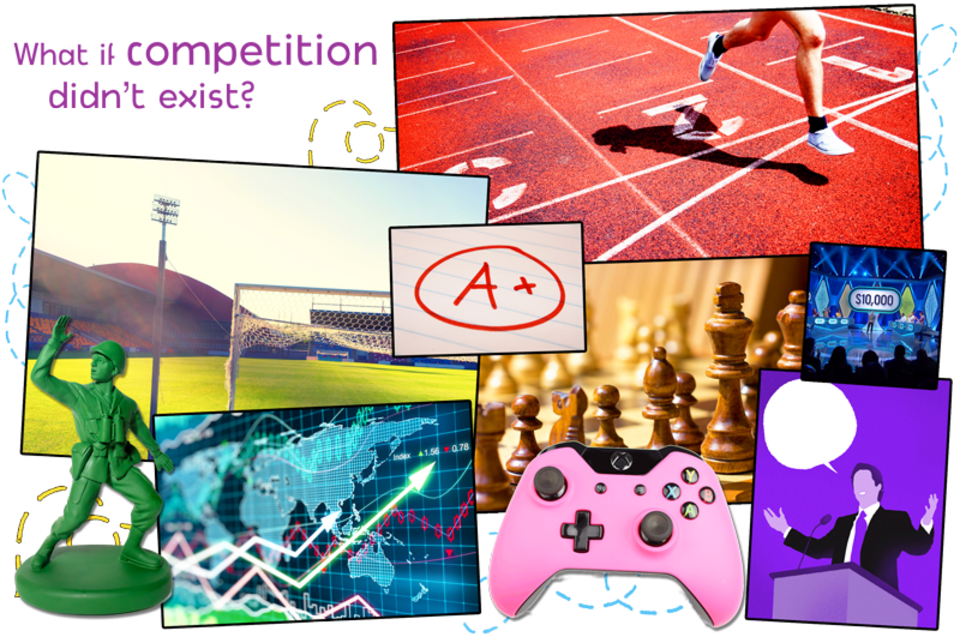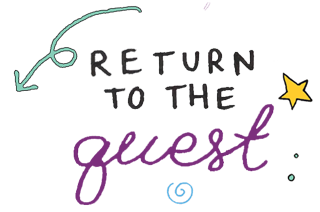
Competition: dangerous or harmless?
| Objective: To envision a completely different universe in order to reveal the hidden dimensions of the concept of competition! |
Duration: 30 to 90 minutes
Material:
- Sheets of paper and pens
- Coloured pencils and markers
Instructions:
Thought experiment: Imagine a world where... competition is eliminated because it’s considered too dangerous! What would this world look like? Would it be fantastic or horrible? How would this world be different from ours? How would life change? Would you want to live in this alternate world? Why or why not?
...
- Think about the effects. As you start brainstorming, you might start second-guessing what the concept of “competition” even means. What is competing? It is just about winning… or about defeating someone else? Is it a good thing to strive to be the best… or a sign of wanting to be superior to everyone? Now think about this alternate world without competition—what happens to games, contests, sports, rivalry, wars? If we can’t compete, does that mean we can’t have enemies? Why or why not? Then try to think of why competition might seem so dangerous in this world—why everyone is told to avoid it at all costs. If competition disappears, does cooperation take over? Make a list of three positive and three negative points of a competition-free world, and add reasons to explain your impressions.
- Variation: Consider how this world might affect life in different contexts, such as: relationships, school, jobs, government, art, religion, the environment, etc.
- Inspiration: To find inspiration, you can think back to the answers you and your family gave in the Philosophical picnic as you were listening to the Jeunes sages podcast episode on competition!
- Create a character. To take your thinking one step further, think about how this alternative world might affect different people in society. For example, what would be the mindset of an Olympic athlete, a game show contestant, a videogamer, a soldier at battle? How might their thoughts, motivations and feelings be different in a world where they couldn’t be competitive? Now invent two characters in this world who would normally be rivals… but can no longer compete. Does their relationship change? Why or why not? Write a little dialogue between this pair of people, imagining what they might have to say to each other now that competition is a thing of the past. Describe their unique experience in as much detail as possible… and offer a little glimpse into their future!
- Represent this world. Based on your reflections, imagine how you could represent your impressions of this alternative world—through a drawing, a collage, a diagram, a poem, or a dance. Your style can be realistic, abstract, comic, dramatic, etc. How could this world help us better understand—and even improve—our own?
...
Bonus: Imagine this alternate world a few decades into the future. A grandparent is trying to explain to their grandchild what society used to be like when there was still competition. What might be some good examples to help describe it? Then picture the grandchild becoming really upset by the story: “Competition sounds horrible!” Ask yourself what the grandparent might say to defend the positive sides of competition. How might it help us? Can it make us better? What does competition feel like in our body? Now imagine the grandparent gets suddenly sad thinking about what’s been lost since competition was eliminated from the world. What losses might they be thinking about? Do you relate more to the grandparent’s perspective or the grandchild’s, and why? |

| Tricks for tots: To help you get a feeling of this world without competition, try playing one of your favourite games… but let the other person win! What do you have to do to make that happen: Show your hand when playing cards? Make a mistake on purpose? Stop following the rules? Think about how this changes the game. Do you still like playing even though you can’t win? Why or why not? Hmm, maybe a game can’t be fun if there is no competition… or maybe it turns out you don’t care about being competitive at all! |
| Tips for teens: According to Gandhi, competition is an ego-driven state that sparks violence and conflict at the expense of mutual aid. Though contemporary societies tend to associate the spirit of competition with progress and motivation, he argues the human race has survived because of cooperation, not rivalry. He gives the example of newborn babies needing love to stay alive and important inventions requiring collective effort to be achieved. For him, competition makes us selfish by leading us to exploit others for our own gain and satisfaction. Do you agree with this idea? Why or why not? Can Gandhi’s vision of a “non-violent society” be achieved even with some kind of competition? If so, how should we adjust our ways of competing? If not, what should replace competition and why? |
Share your creative reflections by sending them via email.
Include photos of your projects and notes of your thoughts, as well as your first name and your age!


